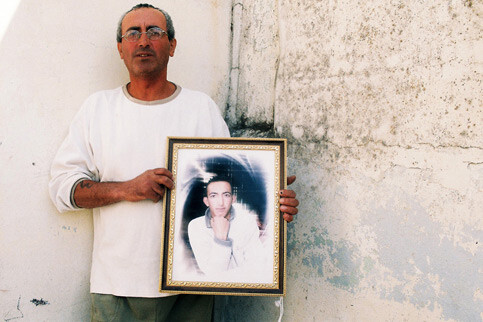The Electronic Intifada 24 April 2008

A Palestinian man holds up a picture of his son who is being held in an Israeli jail. (Shabtai Gold/IRIN)
JERUSALEM/GAZA, 22 April 2008 (IRIN) - For families in the Gaza Strip with sons or daughters in Israeli jails, the past 11 months have been especially hard, as they could no longer visit their imprisoned relatives and have only had contact through brief written messages.
“This issue is a humanitarian concern for us, for the families and the prisoners,” Katharina Ritz, the head of the International Committee of the Red Cross (ICRC) in Jerusalem, told IRIN.
“It is very important the families have contact with the people in jail; and psychologically, for the prisoners, it is important to have contact with the family,” she said, noting that families bring books and clothes for their relatives.
According to the Israeli rights group B’tselem, over 760 Gazans, including four women, are in Israeli jails. They are all there for “security” crimes — anything from alleged membership of an “illegal group” to proven acts of militancy.
The visits program from Gaza, running since 1968, stopped shortly before the Hamas takeover in June 2007, during a period of intense violence in the enclave. Since then, Israel has not agreed to resume the system, in which the ICRC coordinates and facilitates the visits of close relations to the imprisoned Gazans.
“There was a government decision not to allow people out of Gaza, except for humanitarian cases,” said Shlomo Dror from Israel’s Ministry of Defense, referring to medical patients. Israeli officials also noted that Gilad Shalit, the soldier captured in 2006 by Palestinian militants, had not been allowed contact with his family.
“This is not a question of who deserves more; both sides deserve to have contact with their families,” an ICRC official said.
Nearly one year without visits
“The last time I saw my son was on 17 May last year,” Abu Rami said from Gaza City. His son, Rami, was arrested nearly five years ago and sentenced to 15 years in an Israeli jail.
“Before that, I used to go see him every 15 days,” he told IRIN.
When he was able to visit, he had to leave his home at about 4am, returning after midnight the next morning, due to the long security checks and travel time to reach the prison inside Israel.
“But it was worth it, because I could see him; he is my only son,” the father said, adding that Rami had only been allowed to touch his own four-year-old son once since his arrest, and the two have had no contact in the last year.
Communication with the family has been reduced to letters from the prison — which take about six weeks to arrive in Gaza.
He and hundreds of others still apply every week for permission to visit.
“This is a clear indication to me that the human contact the family visit program provides is essential to the families,” said Ritz.
The ICRC said that before June it relayed only about 10 messages a month between prisoners and their families, but now that number had risen to up to 300 a month, with officials stressing that these short messages, subject to military censors, are hardly ideal.
This item comes to you via IRIN, a UN humanitarian news and information service, but may not necessarily reflect the views of the United Nations or its agencies. All IRIN material may be reposted or reprinted free-of-charge; refer to the copyright page for conditions of use. IRIN is a project of the UN Office for the Coordination of Humanitarian Affairs.
Related Links


